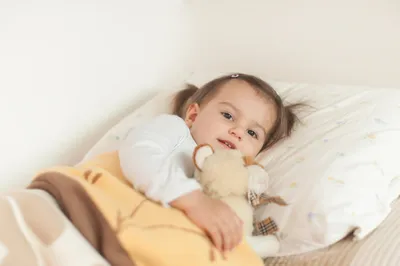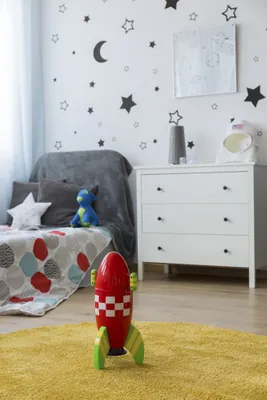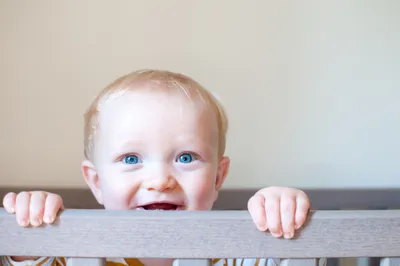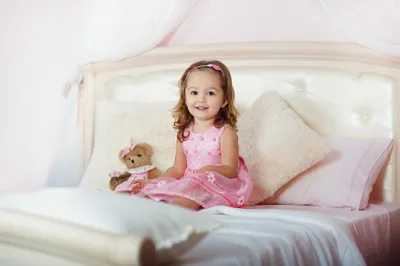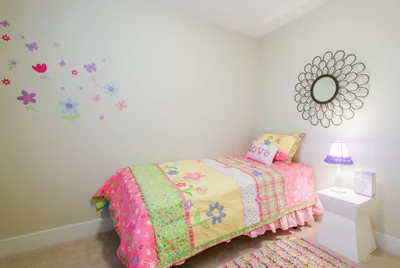When your toddler is sleeping soundly in a crib, you don’t have to worry a lot about them wandering off at night. However, when it’s time for time to have their own bed, it changes the entire game and introduces a whole new set of rules.
BabyCenter.com notes there’s no “set time” that you should be moving your little one from a crib to a bed, but the age can usually range from 1.5-years to 3.5-years. That being said, here are six tips to keep in mind to make the switch as smooth as possible…
1. Consider the Type of Bed That’s Best
BabySleepSite.com notes that you should first consider the type of bed that’ll be best for your toddler. It notes if your toddler is small, then you can get a toddler bed that will safely accommodate the crib mattress (it’s also one less component to buy).
If your toddler was actually starting to outgrow the crib, then you’ll probably be best thinking about a twin bed or larger—unless you want to switch them to a new sleep space in a few months as they are growing exponentially.
2. Make the Bed Their Own
Just like you like to put your own personal touch on your bedroom, apparently so do toddlers, according to Parents.com. It suggests that if you’re choosing a toddler bed for junior, let them customize it by adding their own favorite blankets and stuffed toys.
This can help them be more comfortable in the new bed, as there will be some familiar items for them to snuggle with. You could even take a trip to the store and let them pick out some new kid-friendly sheets and pillowcases, adds the source.
3. Consider Toddler Bed Safety
WhatToExpect.com urges you to take a close look at the bed itself—make sure it’s sturdy, low to the ground, and equipped with rails in case junior takes a tumble during their slumber. Try to avoid elaborate cutout patterns in the headboard that can be tempting to stick objects (like hands) into.
Also look for rounded edges, as toddlers can get excited easily and end up meeting a corner (they won’t win that battle). You can also check to ensure the products have been certified by the Juvenile Products Manufacturers Association (there should be a sticker on it saying so).
4. Think Outside the Bed
You’ve just freed your toddler from their crib, so it’s only natural they will want to exploit their newfound freedom a bit. WhatToExpect.com suggests you reevaluate how well you’ve toddler-proofed your home—it’s one thing for your toddler to be safe when you’re all awake and supervised, quite another when you’re deep asleep.
Your little one may decide to go “adventuring” during the night, so you should block off any stairwells, make sure the windows and doors are locked (you can also add a padlock to the top part of the front door they can’t reach), and lift any potentially harmful materials (including medications) up into cupboards and out of reach, adds the source.
5. Be Ready for a Rough Ride
If your toddler slept soundly through the night in their crib, that may all change during “life after crib,” notes TodaysParent.com. “You may discover that the little angel who used to fall asleep on her own, and slumber solidly through the night, now cries at bedtime and wakes every hour,” it explains.
While it seems like you’ve taken a step back into infant days, the phase will pass, assures the source. You may need to lie down beside their bed until they fall asleep, or sing to them in the middle of the night like when they were a little baby, it adds. However, don’t introduce any calming routines that aren’t realistic long-term (like a puppet show at 2 a.m.).
6. Don’t Lock Them In
You might be feeling a bit overwhelmed by chasing your toddler back into bed in the middle of the night, but locking their door or putting tennis balls over doorknobs to prevent them from opening them can actually put their lives in danger, adds TodaysParent.com.
In an emergency such as a fire, a locked door or other barrier could compromise the safety of your child. A better idea is to install a gate to block the bedroom doorway, “which prevents your child from wandering into a smoke-filled hallway until a parent or other adult can take her to safety,” it adds.

